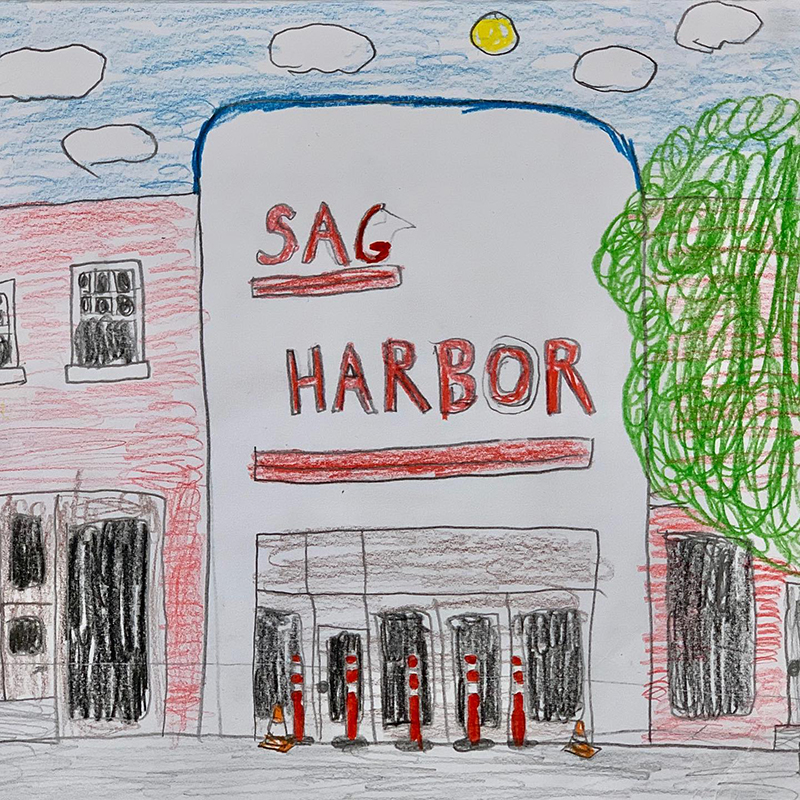
When Viggo Negroponte draws, his lines are frenetic, some deliberately straight while others loop and twist, doubling back on one another to create a car, a tree, a wall, a street — the puzzle pieces of the world he sees.
Despite the visceral energy of each drawing, there is also a certain organization that matches the teenager’s carefully calculated words, often punctuated by a reserved smile from under his mop of brown hair, and his literal interpretation of not only his surroundings but also those around him.
For Viggo, a 13-year-old student in the special education department at Springs School, art is his tool for connection, communication and expression. And, above all, it is the place where he belongs.
In wholehearted agreement, Michael Weisman, co-owner of Golden Eagle Art Supply, has dedicated a section of the East Hampton store to Viggo’s “wonderfully expressive” work — on view noe through the end of December.
“What do I love about drawing? Hmm …” Viggo asked himself on a Monday afternoon, seated on his couch at home next to his mother, artist Virva Hinnemo. “Well, my favorite thing about drawing is because, it just interests me. And it’s relaxing, stuff like that. Yes. It makes me feel good.”
“You’ve always done really well in art class at school,” his mother said.
“Oh, yeah, I think I passed art class at school, right?”
“Oh, more than passed, Sweetie,” she said proudly. “You’ve done really well in art class.”
Ms. Hinnemo and her husband, fellow artist and critic George Negroponte, first noticed their son’s creative inclinations while they lived in Sweden before moving to Springs in 2012. He was just a boy, no older than 5, Ms. Hinnemo said, and even younger when they began to notice his learning difficulties.
“When Viggo was very little, he was not learning to speak. And so we were trying to figure out what was going on, and this was early on in the whole process of figuring out what was going on,” she recalled. “Whenever he did something bright, I was saying in Swedish, ‘Good job, Viggo,’ which is, ‘Bra, Viggo.’ His first words were not ‘Mom,’ or ‘Dad.’ It was, ‘Good job, Viggo.’ Those were his first words, because we were always saying them to him, over and over.
“It’s not easy becoming a teenager, but so far he’s really had this attitude of, ‘Great job, Viggo. I’m doing good, look at me,’” she continued. “I think his art gives him a place to feel like he’s good at something, because he does get a lot of comments about what he makes and what he draws. He gets attention — good attention — for it, so it’s a place where he can shine.”
Viggo began drawing in earnest when his family first moved to the East End, filling sketchbooks with rudimentary maps and depicting himself with a blue dot, much like an iPhone map.
It was only when he began relaying the exact route his school bus would take on a class trip from, say, Springs School to Riverhead — and then draw a map — that his mother realized her son had a photographic memory.
“It was just one phase of his artistic endeavor, but it was really intense,” Ms. Hinnemo recalled.
Viggo laughed modestly. “I was 5 or 6,” he said.
[caption id="attachment_98880" align="alignright" width="418"] The Sag Harbor Cinema by Viggo Negroponte.[/caption]
The Sag Harbor Cinema by Viggo Negroponte.[/caption]
These days, the budding artist finds himself gravitating toward the power, energy and sound of trains, as well as the architecture he sees around East Hampton and Sag Harbor, including firehouses, The American Hotel and the Sag Harbor Cinema. He will often snap a photo and draw the scenes later using colored and graphite pencils, sometimes colored markers, or work completely from memory.
“Drawing makes me feel great, and stuff like that. I’m just paying attention to the image, what I’m doing,” he said, adding, “I usually have good memories for all types of stuff, like drawing and what I was doing when I was a little kid.”
“You can remember dates and places,” Ms. Hinnemo said to her son. “You’ll look at me, Viggo, and you’ll say, ‘Do you remember the song that was on in the car on March 19 of 2008?’ And I go, ‘What?’ And you go, ‘How could you not remember?’ and I say, ‘How could I possibly remember?’”
“Because your brain is small!” Viggo said with a smile.
His mother burst into laughter. “I feel that way sometimes.”